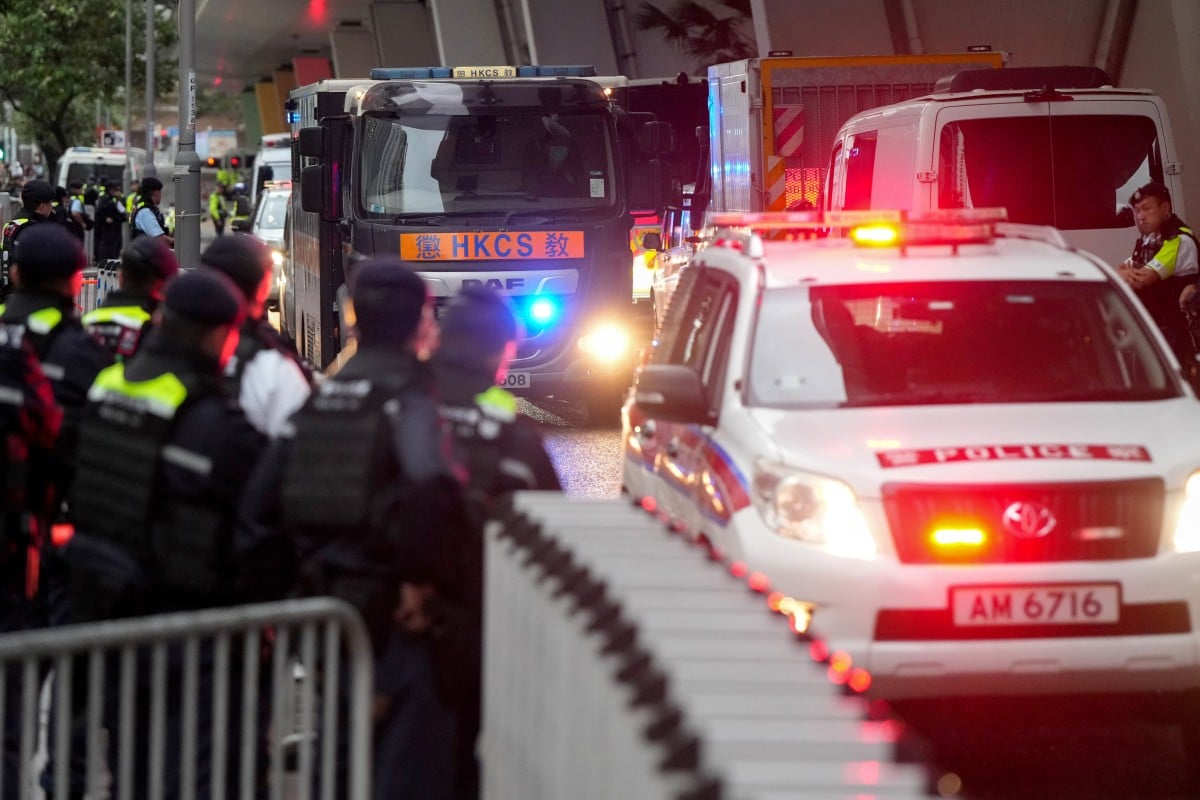 Following a landmark trial, 45 Hong Kong activists were sentenced to four to 10 years in prison for charges related to national security. Photo: Sam Tsang
Following a landmark trial, 45 Hong Kong activists were sentenced to four to 10 years in prison for charges related to national security. Photo: Sam TsangForty-five Hong Kong opposition figures have been jailed for four to 10 years in a landmark national security case over an unofficial election in July 2020. The judges earlier found the poll was part of a plot to bring down the government.
Former legal scholar Benny Tai Yiu-ting received the biggest sentence for the charge of conspiring to subvert state power.
The sentencing on Tuesday ended the city’s largest and longest-running national security trial. The trial initially involved a group of 47 people who were accused of using the 2019 anti-government protests to increase the opposition’s chances of winning control of the Legislative Council.
More than two-thirds of the 45 found guilty had been in custody on remand since March 2021. This will effectively reduce the remaining length of their prison term.
Jail terms: the fine print
Four former lawmakers, including Claudia Mo Man-ching, 67, received the shortest jail term of four years and two months. They are expected to complete their sentences as early as April next year.
But Tai, 60, may need to spend another eight years behind bars.
Tai is a former University of Hong Kong associate professor and a co-founder of the 2014 Occupy movement. He was previously jailed in two cases for a total of 26 months for charges related to incitement during the campaign and illegally incurring election expenses in 2016. He had served four months from previous proceedings before he was remanded for the latest case.
Chief Executive John Lee Ka-chiu called the ruling a fair reflection of the “very serious” nature of the case. He said “anti-China forces” were held to account for destabilising Hong Kong.
Security minister Chris Tang Ping-keung did not rule out appealing against the length of some of the sentences.
“This sentence reflects the severity of the crime and shows that crimes that harm national security must be punished,” he said.
The sentencing hearing at West Kowloon Court lasted 15 minutes, during which activist Joshua Wong Chi-fung waved to the public gallery and proclaimed “I love Hong Kong” before leaving the dock.
The 28-year-old former student leader, seen as the poster boy of the Occupy movement, was jailed for four years and eight months.
He is expected to leave jail in early 2028, having been previously sentenced to a total of more than 2½ years in four unrelated cases.
What the ruling said
In an 82-page document on the reasons for sentence, three High Court judges gave a starting point of 15 years’ imprisonment for Tai after considering him to be a “principal offender”. Judges earlier found his plan to hold the unofficial election was part of an attempt to “undermine, destroy or overthrow” the government.
They sentenced him to 10 years in jail after reducing it by one-third for his early guilty plea.
Hong Kong students should sing national anthem ‘with emotion’, says education chief
In their sentencing, the judges made a distinction between organisers, those who pleaded guilty and those who pleaded guilty and became prosecution witnesses.
The court had cleared two out of the 47 initially charged – former district councillors Lawrence Lau Wai-chung, 56, and Lee Yue-shun, 31 – in May. The judges had doubts about whether the two had agreed to become part of the conspiracy.
The Department of Justice has lodged an appeal over Lau, but not Lee.
What happened on Tuesday
On Tuesday morning, hundreds of residents braved the drizzly weather to join the queue outside the court building, hoping to learn the sentences first-hand.
Only five people succeeded in gaining entry to the public gallery, as most seats were reserved for lawyers and relatives. Another 399 spectators watched the hearing via a live broadcast in separate rooms.
Police were on high alert, pulling some activists in the crowd over to conduct searches.
Justices Andrew Chan Hing-wai, Alex Lee Wan-tang and Johnny Chan Jong-herng refused to give shorter jail terms on the argument by the defence that the plot was “bound to fail”.
They said the participants had been eager to ensure the success of the unofficial election. The judges pointed to evidence of the poll’s design, as well as the discussions on logistics and backup plans in case some candidates were disqualified from the official election.
Under the Safeguarding National Security Ordinance, the city’s domestic counterpart of the national security law, no prisoner convicted of such offences can be granted early release unless authorities believe the decision will not harm the country.
This effectively means that most of the 45 defendants will have to serve their sentences in full before their release.
Hong Kong court finds Stand News, 2 former editors guilty of sedition
The latest ruling drew more criticism from the West. The European Union called it “another unprecedented blow against fundamental freedoms, democratic participation and pluralism in Hong Kong”.
A United States consulate spokesman called for the immediate release of the 45 defendants, saying they were “aggressively prosecuted and jailed for peacefully participating in normal political activity”.
Catherine West, the British foreign office minister for the Indo-Pacific, said the 45 opposition figures were jailed for “exercising rights and freedoms” guaranteed under the Basic Law, the city’s mini-constitution.
In response, Chinese foreign ministry spokesman Lin Jian accused “some Western countries” of making unfair accusations against Hong Kong’s “fair” judicial process.
“No one can engage in illegal activities under the guise of democracy and attempt to escape legal action,” he said.
